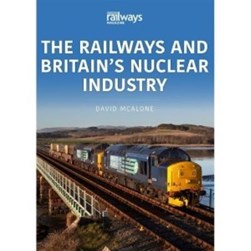-
BROWSE 1000s OF BOOKS IN STOCK
-
FREE DELIVERY ON ORDERS OVER €10
The railways and Britain's nuclear industry
PAPERBACK
Categories:
Trains and railways
This book shows the important role played by the nation's railways in the nuclear industry and how the need to secure that service through the turbulence of privatisation led to the creation of the nation's most diverse railway company, Direct Rail Services. 1945 marked the beginning of the Labour government that would nationalise the railways and witnessed the start of British nuclear weapon development, which led to a civil nuclear industry. By the 1990s both industries were heading for privatisation, though neither would truly be free from government control. This book provides a brief history of British nuclear power and technology, and goes on to illustrate the transport of spent nuclear fuel from around the world to the Sellafield reprocessing plant. In the twenty-first century the decommissioning of reactors and defence establishments across England added to the loads travelling by rail to the national Low Level Waste Repository. The railways also transported chemicals for the nuclear industry, construction materials and - at least in part - the industry's workers too. Direct Rail Services took over this traffic and became a major player in the rail freight business, with a significant role in the nation's passenger market. The book illustrates this transformation and explains why it happens.
€0.00
RRP €14.99

0 Reward Points
Currently out of stock
Extended Range: Delivery in 2-3 working days
Any purchases for more than €10 are eligible for free delivery anywhere in the UK or Ireland!
This book shows the important role played by the nation's railways in the nuclear industry and how the need to secure that service through the turbulence of privatisation led to the creation of the nation's most diverse railway company, Direct Rail Services. 1945 marked the beginning of the Labour government that would nationalise the railways and witnessed the start of British nuclear weapon development, which led to a civil nuclear industry. By the 1990s both industries were heading for privatisation, though neither would truly be free from government control. This book provides a brief history of British nuclear power and technology, and goes on to illustrate the transport of spent nuclear fuel from around the world to the Sellafield reprocessing plant. In the twenty-first century the decommissioning of reactors and defence establishments across England added to the loads travelling by rail to the national Low Level Waste Repository. The railways also transported chemicals for the nuclear industry, construction materials and - at least in part - the industry's workers too. Direct Rail Services took over this traffic and became a major player in the rail freight business, with a significant role in the nation's passenger market. The book illustrates this transformation and explains why it happens.

0 Reward Points
Any purchases for more than €10 are eligible for free delivery anywhere in the UK or Ireland!
€0.00
RRP €14.99

0 Reward Points
Any purchases for more than €10 are eligible for free delivery anywhere in the UK or Ireland!
Categories:
Trains and railways
Product Description
This book shows the important role played by the nation's railways in the nuclear industry and how the need to secure that service through the turbulence of privatisation led to the creation of the nation's most diverse railway company, Direct Rail Services. 1945 marked the beginning of the Labour government that would nationalise the railways and witnessed the start of British nuclear weapon development, which led to a civil nuclear industry. By the 1990s both industries were heading for privatisation, though neither would truly be free from government control. This book provides a brief history of British nuclear power and technology, and goes on to illustrate the transport of spent nuclear fuel from around the world to the Sellafield reprocessing plant. In the twenty-first century the decommissioning of reactors and defence establishments across England added to the loads travelling by rail to the national Low Level Waste Repository. The railways also transported chemicals for the nuclear industry, construction materials and - at least in part - the industry's workers too. Direct Rail Services took over this traffic and became a major player in the rail freight business, with a significant role in the nation's passenger market. The book illustrates this transformation and explains why it happens.
Product Details
ISBN9781913295653
FormatPAPERBACK
PublisherKEY PUBLISHING (30 April. 2022)
No. of Pages96
Weight288
Language English
Dimensions 243 x 170 x 8

